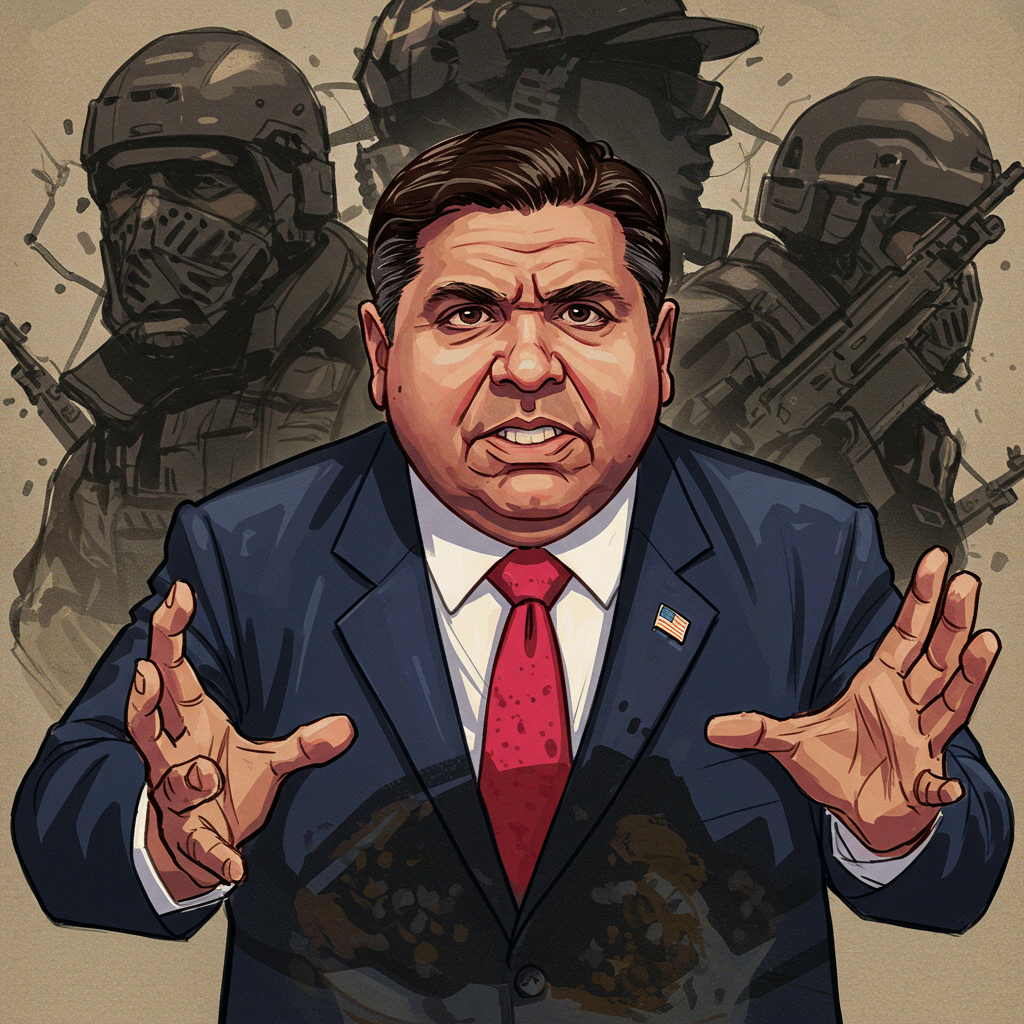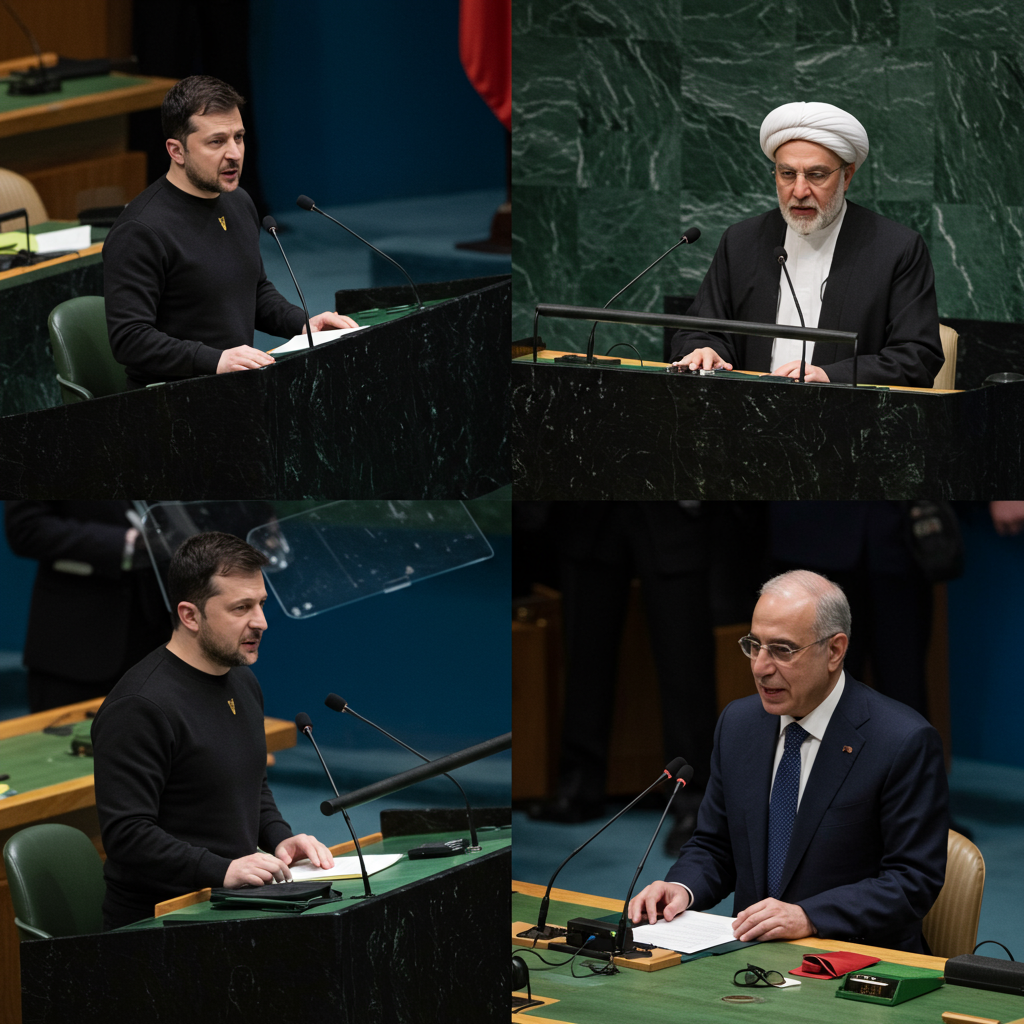In a dramatic escalation of federal-state tensions, Illinois Governor JB Pritzker revealed Saturday, October 4, 2025, that the Trump administration intends to federalize 300 Illinois National Guard members. This audacious move comes after Pritzker staunchly refused an “ultimatum” from what he termed the “Department of War,” which demanded he deploy state troops himself or face federal intervention. The governor condemned the action as “absolutely outrageous and un-American,” setting the stage for a significant constitutional clash over state sovereignty and the deployment of military forces within U.S. borders.
The Federal Ultimatum: A Governor’s Refusal
Governor Pritzker’s announcement came with palpable outrage. He stated the Trump administration presented a stark choice: “call up your troops, or we will.” Pritzker vehemently rejected this demand, asserting there was “no need for military troops on the ground in the State of Illinois.” He argued that state, county, and local law enforcement were already effectively coordinating public safety efforts and protecting citizens’ constitutional rights to peaceful protest, particularly around the Broadview Immigration and Customs Enforcement (ICE) facility in west suburban Chicago.
Pritzker characterized the federalization threat not as a genuine effort to protect public safety, but as a “manufactured performance” driven by a desire for “control.” His refusal to deploy the National Guard underscores a deep-seated resistance to what he perceives as a presidential overreach into state affairs. Lieutenant Governor Juliana Stratton echoed these sentiments, labeling the proposed federalization a “political stunt” designed for “intentional cruelty” that would “rip away” Illinoisans from their families.
Trump’s Nationwide Federal Intervention Strategy
The proposed federalization of the Illinois National Guard fits a broader pattern of President Trump’s strategy regarding domestic law enforcement and protests. Trump has long threatened to deploy federal forces to cities across America, often citing crime rates or the need to protect federal properties. Earlier in the week of October 4, Trump made controversial remarks at the Marine base in Quantico, Virginia, suggesting that “dangerous cities” like Chicago could serve as “training grounds” for the U.S. military. This comment further fueled concerns about the administration’s motivations and the implications of using military assets for domestic policing.
The Trump administration’s aggressive immigration enforcement operations also provide key context. While the President frequently highlighted Chicago’s crime rate as a justification for intervention, official statistics showed a decline in both violent crime and murder rates in the city. Despite this, the Department of Homeland Security (DHS) and Attorney General Pam Bondi intensified rhetoric, claiming ICE agents were “under attack.” Pritzker had previously revealed that DHS had requested 100 military personnel specifically to protect ICE agents in Illinois, a request he found unwarranted.
Precedents: Portland, Los Angeles, and Washington D.C.
Illinois is not the first state to face such a challenge. The Trump administration had already deployed National Guard troops to other American cities, sparking significant legal and political backlash.
Portland, Oregon: Just a week before the Illinois announcement, the Trump administration authorized the deployment of 200 National Guard troops to Portland, specifically to protect ICE facilities and to curb crime, citing threats from “Antifa and other domestic terrorists.” However, Oregon and the city of Portland swiftly sued, seeking a temporary restraining order to prevent the deployment. Portland officials argued that the federal justification was based on a “perception-versus-reality problem,” asserting that local law enforcement could handle the situation. A ruling in that case was anticipated around the same time as the Illinois developments.
Los Angeles, California: Earlier in the year, National Guard troops and Marines were sent to Los Angeles, ostensibly to quell “anti-ICE protests.” A federal judge subsequently ruled this deployment illegal in early September, setting a significant legal precedent.
Washington D.C.: The nation’s capital also saw federal deployment, with attorneys filing a lawsuit to challenge the presence of National Guard troops, which the President claimed were sent to fight crime.
These precedents highlight an ongoing legal and constitutional debate over the President’s authority to deploy federalized military forces within American cities without the consent, or even against the will, of state governors.
Escalating Tensions on the Ground in Illinois
The federalization attempt in Illinois came amid heightened tensions and direct confrontations between federal agents and protesters.
Broadview ICE Facility: Clashes between federal agents and protesters at the Broadview ICE facility were ongoing. Over the past couple of weeks, more than a dozen protesters had been arrested, with at least five facing charges of resisting, obstruction, and aggravated battery to a police officer on Friday alone.
Federal Presence and Actions: DHS Secretary Kristi Noem and U.S. Border Patrol official Greg Bovino were reportedly in Chicago overseeing ICE operations, even observed on the ICE facility’s roof with armed agents, cameras, and a production crew, leading Pritzker to allege actions were for “social media videos” rather than justice. Pritzker further accused masked federal agents of throwing chemical agents near an elementary school, arresting elected officials, and raiding a Walmart, all without state coordination.
Civilian Shootings and Raids: On the same day as Pritzker’s statement, a woman was shot by U.S. Border Patrol agents on Chicago’s South Side, marking the second civilian shooting since the administration’s immigration operation commenced. ICE agents also reportedly raided an apartment building in Chicago’s South Shore neighborhood, detaining residents overnight, including women and children. Chicago journalist Steve Held was also arrested and detained after being subjected to tear gas and pepper pellets during demonstrations outside the Broadview facility.
These incidents provided a stark backdrop to Pritzker’s condemnation, reinforcing his argument that federal agents were engaged in “unprecedented escalations of aggression” against Illinois residents.
A Constitutional Battle for State Sovereignty
Governor Pritzker’s strong opposition underscored a fundamental disagreement over presidential authority and states’ rights. He emphasized that federal law generally prohibits the use of the military for domestic law enforcement, making the administration’s demand even more contentious. The governor’s refusal to comply was a clear assertion of state sovereignty. Lieutenant Governor Stratton added that “the only emergency in Chicago is the chaos that Donald Trump and his administration are deliberately fueling.” She warned that flooding neighborhoods with federal troops would “spread fear, escalate conflict, and undermine trust,” rather than improve public safety.
Pritzker even called for the invocation of the 25th Amendment following President Trump’s comments about using cities as “training grounds.” This signals the profound depth of the political and constitutional crisis brewing between the state of Illinois and the federal government. The unfolding events represent a critical moment in the ongoing debate about the balance of power and the appropriate role of federal military forces in American cities.
Frequently Asked Questions
What prompted the Trump administration’s attempt to federalize the Illinois National Guard?
The Trump administration sought to federalize 300 members of the Illinois National Guard after Governor JB Pritzker refused an ultimatum to deploy state troops himself. This move was part of President Trump’s broader strategy to crack down on crime, particularly in cities led by Democratic mayors, and to protect federal facilities, especially those of Immigration and Customs Enforcement (ICE). The administration cited rising attacks on ICE agents and general crime rates in Chicago as justification, despite Governor Pritzker pointing out a decline in Chicago’s crime statistics.
How does this Illinois situation compare to other federal National Guard deployments by the Trump administration?
The attempt to federalize the Illinois National Guard mirrors similar actions and threats by the Trump administration in other cities. Federal troops were previously deployed to Portland, Oregon, and Los Angeles, California, to address protests and protect federal properties. Notably, a federal judge ruled the Los Angeles deployment illegal in early September, and a lawsuit challenging the Portland deployment was ongoing concurrently with the Illinois situation. These incidents collectively highlight a pattern of the Trump administration using federalized military forces in states without gubernatorial consent, often leading to legal challenges and accusations of federal overreach.
What are the legal and constitutional arguments against federalizing a state’s National Guard without gubernatorial consent?
The primary arguments against federalizing a state’s National Guard without gubernatorial consent center on state sovereignty and federal law generally prohibiting the use of the military for domestic law enforcement. The National Guard is typically under state control unless federalized by presidential order, but this power is often debated, especially for domestic law enforcement roles against a governor’s wishes. Opponents, like Governor Pritzker, argue such actions are “outrageous and un-American,” asserting they violate the constitutional balance of power and undermine a state’s ability to manage its own public safety and civil liberties. Legal challenges in other states underscore the contentious nature of these deployments.
Conclusion: An Unfolding Constitutional Battle
The confrontation between Governor Pritzker and the Trump administration over the federalization of the Illinois National Guard encapsulates a critical struggle for power and principle. Pritzker’s unwavering opposition, rooted in concerns about state sovereignty, civil liberties, and the militarization of domestic law enforcement, directly challenges the President’s assertive approach to urban unrest and immigration enforcement. As legal battles continue in other states and tensions remain high in Illinois, this situation underscores the profound constitutional questions at stake. The outcome will not only shape the future of federal-state relations but also redefine the boundaries of presidential authority regarding domestic use of military force. This remains a developing story with significant implications for American governance.


